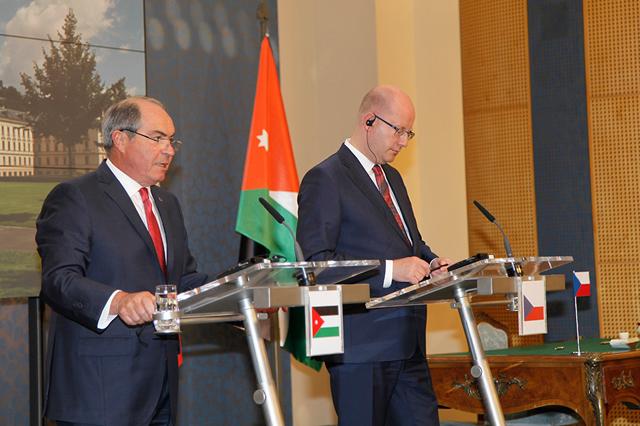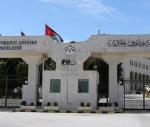You are here
Syrian crisis stretched Jordan to the limit — Mulki
By JT - Apr 06,2017 - Last updated at Apr 06,2017

Prime Minister Hani Mulki holds talks with EU foreign policy chief Federica Mogherini in Brussels on Wednesday (Petra photo)
AMMAN — Jordan has reached the maximum capacity as per the available resources shared with the Syrian refugees, Prime Minister Hani Mulki said on Wednesday, stressing that the crisis has stretched the country to the limit regarding several aspects.
In a speech he delivered at the “Supporting the Future of Syria and the Region — Brussels Conference” held on Tuesday and Wednesday, Mulki said that without the support of the international community, the Kingdom’s capability to continue providing services to the Syrian refugees would be on the line, and this applies to the services provided to the citizens themselves.
The conference was held at the European Union’s headquarters with the joint presidency of the EU, Germany, Norway, the UK, the UN, Kuwait and Qatar with delegations representing 70 countries and international parties.
Mulki headed the Jordanian delegation that comprised Planning and International Cooperation Minister Imad Fakhoury and the Jordanian Ambassador in Brussels Yousef Batayneh.
Mulki warned that leaving Syria’s neighbours without the necessary support would lead to further spillover of the crisis and increase the suffering of refugees.
“This sudden influx, and the protracted nature of the crisis now in its seventh year, has pushed our absorptive capacity to its limits. It is impacting all aspects of life in the Kingdom. According to recent studies, the direct cost of the crisis since 2012 has amounted to $10.6 billion [averaging $2 billion per year], while the indirect costs are estimated at an annual average of $3.1 to $3.5 billion,” the premier said.
Jordan, on behalf of the international community, hosts the Syrian refugees and provides them with the services they need in spite of military, security and humanitarian challenges it is facing, Mulki told his audience.
The Kingdom is currently hosting about 1.3 million Syrian refugees with only half of them registered with UNHCR, he said, noting: “This represents a 20 per cent ratio to the Jordanian population and this is equivalent to 100 million refugees being hosted by the EU, not factoring that EU, on average, is more than 500 percent wealthier than Jordan in terms of per capita income”.
“Today, we meet again in the spirit of global giving, reciprocity and fair burden — sharing to address the worst humanitarian crisis of our time and its impact on hosting countries”, he said.
The partnership with the international community and donor countries to shoulder the burdens of the Syrian crisis has helped Jordan boost its resilience in light of turbulent and unprecedented regional conditions, he said, and the Kingdom, in spite of the lack of resources, welcomed those seeking refuge. In the outcome, the premier said, Jordan stands as the highest registered refugee hosting country worldwide both in absolute and relative terms.
The repercussions of the Syrian crisis caused an increase in needs, setbacks in development gains and affected economic growth, increasing public debt and affecting the course of sustainable development, the prime minister said, noting that this led to increasing poverty and unemployment in host communities, which threatens their security and social fabric.
The conference to support Syria and the region that was held in London last year brought together leaders from around the world to face the challenge and help those who were affected by “the worst humanitarian crisis in history” and respond to the needs of countries hosting refugees, Mulki said, noting that Jordan proposed with its international partners a holistic approach that does not only face the crisis with sustainable solutions but also turns the challenge of hosting refugees into an economic opportunity.
Last year, support to the Jordan Response Plan to help host communities and refugees reached 61 per cent compared to 30 per cent in previous years, Mulki said, referring also to the deal signed with the EU to simplify the rules of origin and help Jordanian products reach European markets and thus finding more jobs for both Jordanians and Syrian refugees.
He said that more than 90 per cent of the Syrian refugee children have been enrolled in public schools and around 45,000 work permits were issued for refugees in camps and outside to work in sectors where non-Jordanians can be legally hired.
One of the major challenges facing Jordan because of the Syrian crisis lies in the fact that Jordan›s border with Syria extends to 378km, which means that preserving the security of the Kingdom requires additional resources and regional and international development-oriented assistance.
He noted that last year, Jordan saw recurrent terrorist attacks against strategic targets that led to the murder of officers in the line of duty, which showed the growing danger threatening Jordan.
He said that Jordan has also contributed a considerable share in regional and global efforts towards peace, stability and security “in an unprecedented manner”.
On Syria, he said that Jordan is working with partners to reach a peaceful solution that preserves the unity of the Syrian territory and political sovereignty.
“Jordan, therefore, supports the Geneva process as the only platform for agreeing on a political solution, on the basis of Geneva 1 and UNSCR 2254”, the premier said.
He added: “Let’s prepare Syrian refugees for the task of rebuilding their country, when the canons fall silent and peace prevails again. Let us also work collectively and with international community for the safe return of all refugees to their home as soon as conditions allow for it and in accordance to international law and interests of host countries”.
“Relaxed rules of origin reached with the EU increase the potential for more trade and investments thus creating jobs and training opportunities for Jordanians and Syrian refugees”, Mulki said.
On the sidelines of the conference, Mulki met with UN Secretary General António Guterres, Lebanese Prime Minister Saad Hariri, High Representative of the European Union for Foreign Affairs and Security Policy Federica Mogherini, Norwegian Foreign Minister Borge Brende, EU Commissioner of Neighbourhood Policy and Enlargement Negotiations Johannes Hahn, EU Commissioner for Humanitarian Aid and Crisis Management Christos Stylianides and Adnan Mazarei, deputy director of the IMF’s Middle East and Central Asia Department.
During the meetings, Mulki discussed regional developments and means to mitigate the impact of the Syrian crisis on the Kingdom as well as the refugees.
Related Articles
AMMAN — Minister of Planning and International Cooperation Imad Fakhoury has participated in several high-level meetings as part of Jordan’s
AMMAN — His Majesty King Abdullah on Sunday met with UNHCR High Commissioner Filippo Grandi, who is visiting Jordan as part of a broader mis
AMMAN — Prime Minister Hani Mulki on Tuesday paid an official visit to the Czech Republic, during which he held talks with Czech Prime Minis


















